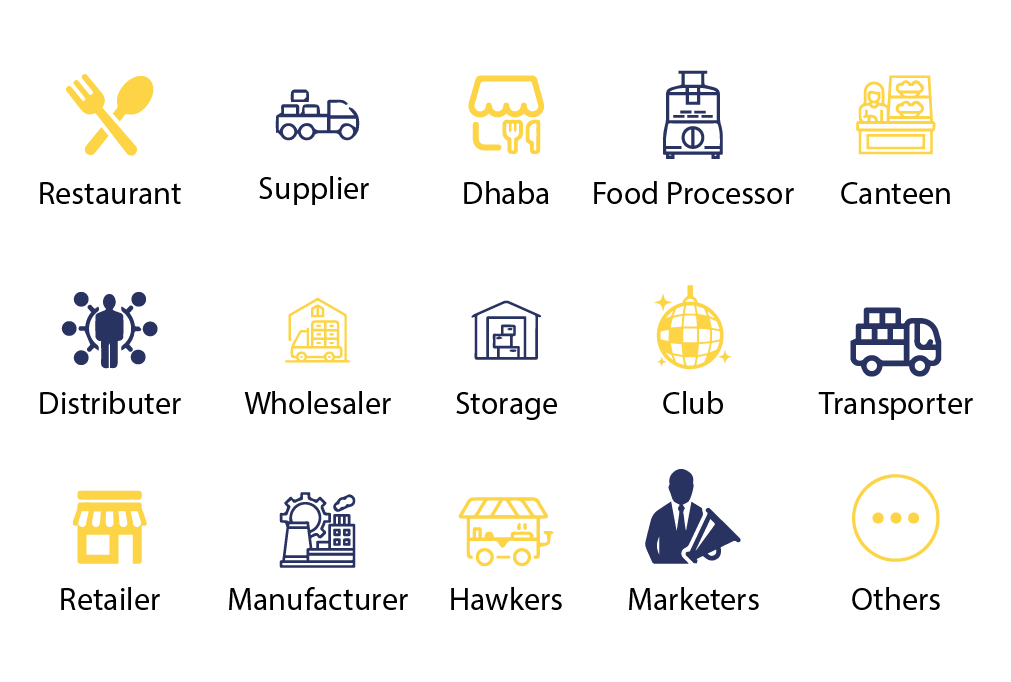Fssai
Central License in Detail
How to Start Central FSSAI license



Overview
Fundamental Functions and Duties performed by FSSAI
- Publish guidelines and norms for food safety and hygiene.
- Launch nationwide initiatives to raise food safety awareness among businesses and consumers.
- Take appropriate legal actions against food businesses involved in illicit practices such as food adulteration.
- Provide recommendations to the Government of India (GOI) for developing new policies.
- Issue mandatory food licenses and registrations to food business operators.
- Roll out guidelines and directions in accordance with the FSS Act, 2006 for entities operating in the food sector.
Businesses that Require Mandatory FSSAI License
A sole proprietor is the owner of a sole proprietorship and is recognized as the same entity as the business. As the sole proprietor, the individual is entitled to all the revenue generated by the business. The business is entirely under the proprietor’s control, giving them full authority to make all decisions.
To operate a business as a sole proprietor, certain licenses and permits are required. These depend on the industry, state, and locality.
In India, a proprietorship is an unregistered business entity owned, managed, and controlled by a single individual. This structure is preferred by micro and small businesses operating in the unorganized sector. Starting a sole proprietorship in India is straightforward, as it involves minimal regulatory compliance. It is an ideal option for entrepreneurs launching small businesses with a limited client base. However, the liability of a sole proprietorship is unlimited, and it does not have perpetual existence.

Mentioned below list of businesses mandatorily require the Registration under Food
Safety and Standard Act, 2006 Restaurants
- E-commerce businesses such as online home kitchen food business operators.
- Food business operators of Indian Railways, airports, etc.
- Supermarkets such as Reliance, Vishal Mega Mart.
- Manufacturers of powdered tea.
- Food vending machine operators.
- Food businesses that sell Herbalife-based products.
- Food business operators of Indian airports.
- Food marketing companies.
- E-commerce businesses that sell food products online.
- Catering businesses.
- Event management businesses.
- Colleges and other institutions providing canteen facilities.
- Businesses involved in the retail, export, and import of food products.
- Agricultural product businesses.
- Manufacturers/sellers of packaged products.
- Manufacturers/sellers of various types of oil.
- Manufacturers/sellers of packaged drinking water.
- Businesses involved in the export/import, retail, and wholesale of dairy products.
- Food transporters.
- Repackagers of food items.
- Milk chilling units.
- All types of food business operators.
Why apply for the FSSAI Central License?
Nationwide Identity
The FSSAI License ensures security and legal rights for all stakeholders involved in the food business. It serves as evidence that the quality of food and operations adheres to food safety standards, enhancing trust and credibility in the industry.
Business Expansion
With an FSSAI Central License, businesses can seamlessly expand to new locations and open additional outlets. This certification also simplifies access to business loans and other funding opportunities, supporting growth and development.
Check your eligibility for FSSAI Central license
FSSAI Central License Is Lawful clearance Granted By the FSSAI to all Food Businesses Which Have –
Apart From These Essential Criteria, FSSAI Central License Also including The following-
- Dairy facilities producing milk solids with an annual production capacity ranging from 50,000 litres to 2,500 megatons.
- Food processing units with a daily production capacity of 2 megatons.
- Processing units with a daily production capacity of 2 MT for vegetable oil.
- Slaughter units with the following daily capacities:
- 1,000 poultry birds
- 150 small animals
- 50 large animals
- Meat processing units with a daily production capacity of 50 kg or 150 megatons.
- Food businesses engaged in shipping food articles abroad.
- Catering or food marketing businesses must have a yearly turnover exceeding Rs 20 crores.
- Food processing units with refrigeration or cold storage facilities of 1,000 megatons or more.
- Government-related food catering services operating at seaports, airports, etc.
- Wholesalers in the food business must have a yearly turnover exceeding Rs 20 crores.
- Retailers and distributors of food articles must have an annual turnover exceeding Rs 20 crores.
- Establishments in the business of health supplements and nutraceuticals.
- Meat processing units with a daily production capacity of 50 KG or 150 megatons.
- Food businesses engaged in shipping food articles abroad.
- Catering or food marketing businesses with a yearly turnover exceeding Rs 20 crores.
- Food processing units with refrigeration or cold storage facilities of 1,000 megatons or more.
- Government-related food catering services operating at seaports, airports, etc.
- Wholesalers in the food business with a yearly turnover exceeding Rs 20 crores.
- Restaurants and eating houses with an annual turnover of INR 20 Crore.
Neecessary Conditions While Applying For FASSAI Centeral License:
- Running a restaurant or hotel with 5-star or 7-star ratings.
- Starting a transport business with more than 100 vehicles.
- Documents Required For FSSAI Cenral License Application
- Form B (duly filled and signed by the applicant).
- Name and list of machines currently operational at the plant.
- Authorization letter if the applicant is seeking registration for a company.
- Copy of trust deed and trustee records (in case of a registered trust).
- Copy of incorporation certificate, MOA, and AOA (for incorporated entities such as Private Limited or LLP).
- A complete partnership deed copy reflecting all partner details and authorization (in the case of a partnership firm).
- A complete co-operative society deed (in case of a co-operative society).
- Registered/Notarized rent agreement with NOC and electricity bill of the business place for address proof.
- Detailed Food Safety Management Plan (FSMS) and a blueprint of the processing unit.
- List of active raw material suppliers with NOC.
- NOC from concerned local authorities related to processing.
- Copy of the tourism certificate issued by the Ministry of Tourism (if registration is sought by a hotel owner).
- IEC certificate by DGFT (Directorate General of Foreign Trade) (if the applicant is involved in shipping food articles abroad).
- Declaration in case the turnover exceeds Rs. 20 crores.
Simple Steps for Obtaining FSSAI Central License
Step-by-Step Process For Obtaining Central FSSAI License:
Step 1: Submission of Form B
The applicant must submit Form B along with the required documents as per the guidelines prescribed by the FSSAI authority through the official FSSAI website. While submitting, the applicant should consider the turnover criteria.
Step 2: Application Scrutiny by FSSAI Officials
The application is scrutinized by FSSAI officials in-depth. If they are not satisfied with the documentation, they may raise objections and request the applicant to complete the documents and fulfill any other formalities.
Step 3: Site Inspection Scheduled by FSSAI Officials
The FSSAI central authority will assign designated officials to inspect the processing unit and verify the details provided by the applicant. The inspection ensures compliance with the FSSAI Act, 2006. Any non-conformity during the inspection may result in application rejection or objections.
Step 4: Approval of Application and Granting License
Once the licensing authority is satisfied with the inspection and documentation, the application is approved, and the license is issued within a few days. After obtaining the certification, the business owner can commence their business operations.
Note: Displaying the certificate at the business premises is mandatory for the license holder.
Secure the FSSAI Central License is very easy with
Legaltax
Step-by-Step Proceess for Obtaining Central FSSAI License:
Step 1:Submission of form B
The applicant must submit Form B along with the required documents as per the guidelines prescribed by the FSSAI authority through the official FSSAI website. While submitting, the applicant should consider the turnover criteria.
Step 2: Aplication Scrutiny by FSSAI Officials
The application is scrutinized by FSSAI officials in-depth. If they are not satisfied with the documentation, they may raise objections and request the applicant to complete the documents and fulfill any other formalities.
Step 3:Site Inspection Scheduled by FSSAI Official
The FSSAI central authority will assign designated officials to inspect the processing unit and verify the details provided by the applicant. The inspection ensures compliance with the FSSAI Act, 2006. Any non-conformity during the inspection may result in application rejection or objections.
Step 4: Approval of Application and Granting License
Once the licensing authority is satisfied with the inspection and documentation, the application is approved, and the license is issued within a few days. After obtaining the certification, the business owner can commence their business operations.
Note: Displaying the certificate at the business premises is mandatory for the license holder.
FAQ’s
